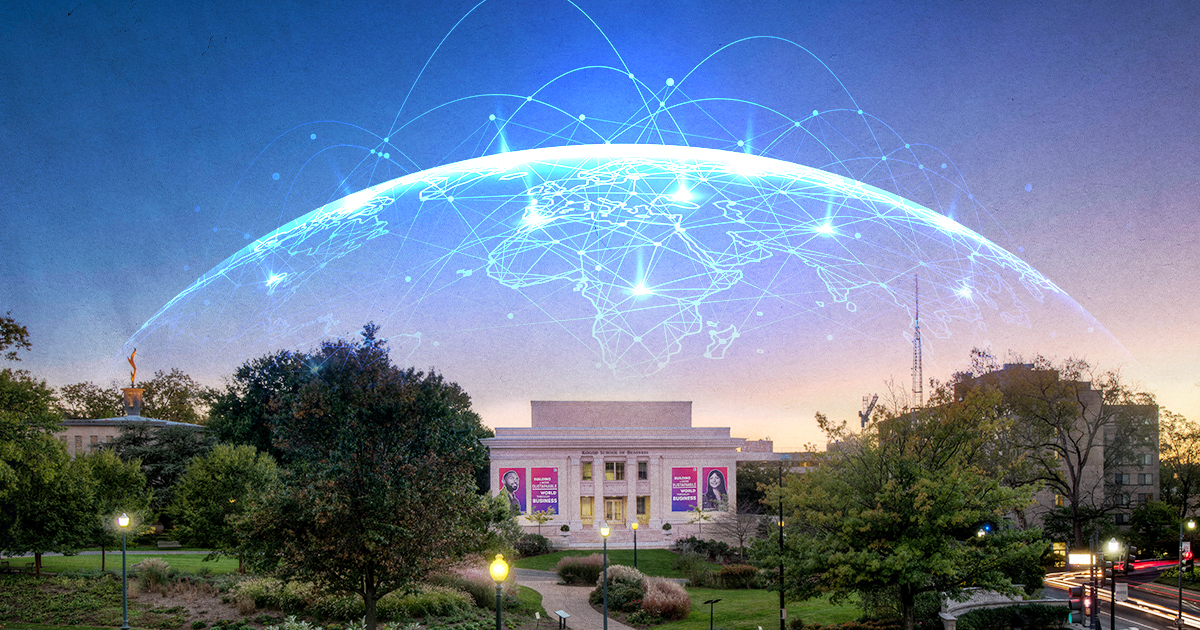
Darby Joyce
Content Marketing Coordinator
When it comes to both her research and her teaching style, Kogod professor of information technology and analytics Mahsa Oroojeni keeps an eye on the future. With interests ranging from sustainability issues in supply chains to machine learning algorithms, her studies and expertise business analytics. In the classroom, Oroojeni not only brings that expertise but also a focus on collaboration and broadening horizons.
“My interdisciplinary background informs my teaching by exposing students to a wide range of perspectives and methodologies,” she explained. “I encourage my students to think critically, draw connections across disciplines, and apply interdisciplinary problem-solving approaches.”
Oroojeni’s background includes a wide range of academic and professional experience. After earning her PhD from Northeastern University in Boston, she went on to conduct research at Johns Hopkins University and the Massachusetts General Hospital. Throughout her studies, she developed experience in data analytics, operations research, and industrial engineering. She bolsters that experience with her work in healthcare and transportation systems. By the time she started teaching at Kogod, she had a well-rounded skill set that translated easily into preparing her students for work in the analytics field.
“I prioritize practical relevance in the classroom,” Oroojeni said. “Integrating case studies, industry insights, and current research findings into my curriculum allows students to gain practical skills and insights that are directly applicable to their future careers.”
Oroojeni focuses on practical education by encouraging innovation and exploration in both her courses and beyond. Through real-world scenarios and empirical evidence, she demonstrates to her students how their learning can be applied to their work; however, she also takes it a step further by encouraging them to keep an eye on trends and new technologies. Whether they learn programming languages and other technical skills or seek internships and research projects, Oroojeni knows that the best way to learn is by doing, especially in rapidly advancing fields such as green supply chains and machine learning.
I encourage my students to question assumptions, experiment with new approaches, and engage in hands-on projects. I hope to create a dynamic learning environment where students feel empowered to explore, experiment, and learn from failure.”

Mahsa Oroojeni
Professor of Information Technology and Analytics, Kogod School of Business
Oroojeni’s commitment to learning extends past her classroom and applies just as much to her own research. Over the course of her career, she has focused her studies on sustainability in supply chains and the role of machine learning in business. Though the two topics are quite different, they often converge in exciting ways, which interested Oroojeni as she learned more about both.
“I was propelled towards the intersection of green supply chains and machine learning, where I now seek to leverage advanced analytics and optimization methodologies to foster sustainable practices within supply chain networks,” she explained. “My research interests underscore my commitment to addressing contemporary challenges in environmental sustainability and operational efficiency through innovative technological solutions.”
Oroojeni first became interested in green supply chains during her graduate studies, where she focused on operations research and systems engineering in socioeconomic contexts. There, she learned more about the sustainability challenges within supply chains and the potential for small changes to add up.
“I was amazed by the impact that minor operational changes can have on reducing environmental footprints,” she recalled. “Even minor alterations in packaging materials or transportation routes can often result in substantial improvements in efficiency and sustainability.”
From there, she developed a focus on innovative solutions to common supply chain problems and a goal of keeping environmental consciousness in mind while still improving the efficiency of logistical systems. While continuing her research at Hopkins and the Massachusetts General Hospital, her research interests expanded when she saw the growing power of machine learning to comb through massive datasets and uncover crucial insights. In particular, she was surprised that an algorithm could pick up on subtle patterns in a patient’s data, potentially pointing out correlations that might have been missed otherwise.
“The capability of these models to discern nuanced relationships among variables has significant implications for clinical decision-making and personalized medicine, underscoring the transformative nature of data-driven approaches in healthcare,” Oroojeni explained.
It’s a fascinating time to conduct research in both machine learning and green supply chains, and Oroojeni is looking forward to tackling some of the questions herself. At the moment, she hopes to combine her two interests by investigating how machine learning algorithms can be applied to sustainability challenges—not only in supply chains but also in energy systems and environmental management. She is also keeping an eye on the current discussions around machine learning, from its ability to handle a wide range of datasets to the ethics of artificial intelligence.
“Discussions surrounding algorithmic bias, discrimination, and privacy have sparked conversations on the responsible deployment of AI systems,” Oroojeni said.The ethical implications of AI and machine learning are garnering increased attention, particularly concerning issues of fairness, accountability, and transparency, and guidelines are being developed to govern AI research and practice.”

Mahsa Oroojeni
Professor of Information Technology and Analytics, Kogod School of Business
Transparency is also a major discussion in the supply chain world right now. Where the discussion around sustainability in supply chains used to focus on ensuring that companies were meeting regulations, Oroojeni has seen a major shift in the discussion in recent years. With consumers more interested than ever in ensuring that they are supporting brands that match their values, businesses have recognized that sustainability measures have come to impact a brand’s reputation. This has extended to manufacturing, where it has become vital to ensure that a supply chain can be traced so that consumers and stakeholders alike are able to see how their products are being made—and if they are, in fact, being made and delivered in an environmentally friendly way.
“Stakeholders are keen on comprehending the social and environmental repercussions linked to manufacturing and distribution, prompting the need for enhanced transparency and accountability across the supply chain,” Oroojeni explained.
Whether it’s creating a more sustainable supply chain system or examining how machine learning can best be utilized in data analysis, Oroojeni will ask and pursue big questions. As a researcher, a professional, and a teacher, she is just as committed to learning as she is to teaching, and her field is full of ways to do both.
“I’m always open to new professional growth and development opportunities,” she said. “Whether it involves participating in conferences, engaging in collaborative research endeavors, or delving into emerging academic trends, I am dedicated to lifelong learning and remaining at the vanguard of my discipline.”
Learn more about Kogod's strides in analytics here.
